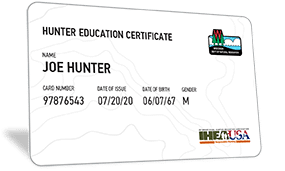
AGE REQUIREMENTS FOR WISCONSIN HUNTERS
Every hunter in Wisconsin who was born on or after January 1st, 1973 is required to complete Hunter Education Certification. There is no minimum age to get certified.

WISCONSIN HUNTING EDUCATION REQUIREMENTS
WHAT IS A WISCONSIN HUNTER EDUCATION CERTIFICATE
A Wisconsin Hunter Education Certificate proves that you’ve obtained the knowledge needed to hunt safely, responsibly, and ethically, within the state of Wisconsin. Any person born on or after January 1st, 1973, who hunts within the state of Wisconsin must obtain a hunter education certificate.
WHERE CAN I GET MY WISCONSIN HUNTER EDUCATION CERTIFICATE?
You can obtain your Wisconsin Hunter Education Certificate by completing a Wisconsin Department of Natural Resources approved course. Courses can be taken either online or in-person, depending on your preference.
In-Person (Classroom) Course Option
Traditional classroom courses are available in various counties throughout the year. The classroom course takes a minimum of 10 hours to complete and costs $10 per student.
Online Course – 18 years of age or older
Hunters who are 18 years of age or older may complete their hunter education entirely online through an approved course provider. The online course takes 4-6 hours to complete, in addition to required quizzes and a final exam. Upon successful completion of the online course, the student will be issued a Hunter Education Certificate and can go hunting immediately.
Online Course – Under 18 years of age
Hunters who are less than 18 years of age when they register to complete an online course will also be required to complete an in-person field day. Upon successful completion of the online course, students will be issued a certificate. The certificate must be presented at the field day in order to participate. Once both the online course and field day have been completed the student will be issued their Hunter Education Certificate.
HOW OLD DO I HAVE TO BE TO GET A HUNTER EDUCATION CERTIFICATE IN WISCONSIN?
There is no minimum age to get certified with your Wisconsin Hunter Education Certificate. As of 2017 the minimum hunting age in Wisconsin was eliminated, which means that a child of any age can participate in the sport however, there are restrictions that apply to youth hunters.
AGE AND SUPERVISION REQUIREMENTS
Hunters who are less than 14 years of age must be supervised by an adult while hunting. Hunters who are 12-13 years of age must obtain a hunter education certificate, and be supervised by an adult. Hunters who are 14 years of age or older are permitted to hunt alone as long as they have obtained hunter education certification.
HOW LONG DOES IT TAKE TO GET MY HUNTER EDUCATION CARD?
It typically takes about 4-6 hours to get your Wisconsin Hunter Education Certificate online. In-person courses typically take a minimum of 10 hours to complete.
Who is exempt from having to obtain a Wisconsin Hunter Education Certificate?
- Any individual born before January 1, 1973
- Any person who has completed US armed forces basic training, and provided proof of successful completion to the Wisconsin DNR
- Any person who has successfully completed an approved hunter education course from another state, province, or country and has submitted evidence to the DNR
What is a mentored hunting program?
Mentored hunting programs are available to hunters of all ages in the state of Wisconsin who wishes to learn more about the sport.
A mentee can be:
- Any person who is less than 12 years of age, regardless of if they have completed hunter education
- A person of any age who has not completed hunter education, and who is not exempt.
A mentor can be any person who:
- Is 18 years of age or older
- Is the parent or guardian of the mentee, or has permission from mentee’s parent or guardian, unless the mentee is 18 years of age or older
- Has completed a state-approved hunter education course or is exempt from the hunter education requirements
Is my Wisconsin Hunter Education Certificate valid in other states?
Yes. The Wisconsin Hunter Education Certificate is accepted in all states, provinces, and countries that have mandatory hunter education requirements. Although most regions will accept the Wisconsin Hunter Education Certificate, hunters should always be sure to check the rules and regulations of the region where they plan to hunt.
What's the difference between a Hunter Education Certificate and a Hunting License?
A Hunter Education Card proves that you’ve obtained the knowledge you need to hunt safely and ethically in Wisconsin, and is different from a Hunting License. The Hunting Licence is similar to a permit and is required to hunt any game animal within the state. Different licenses and permits may be required depending on which game animal is being hunted.
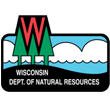
HUNTING LICENSES, STAMPS, AND PERMITS
HUNTING LICENSES
A Hunting License is required in the state of Wisconsin to hunt any game animal. There are a variety of license types available depending on your age, residency status, and what type of game you plan to hunt.
Resident License
Resident licenses are available to individuals who are residents of the state – a resident is any person who has lived within the state for 30 days or longer. A resident license is required for any person 10 years of age or older who hunts any game within the state. There are various types of resident licenses available depending on the hunter’s age, the type of firearm being used, and the type of game being hunted.
NON-RESIDENT LICENSES
Nonresident licenses are available to residents of other states or provinces who wish to hunt within the state of Wisconsin. A license is required for any nonresident 10 years of age or older. The type of license or permit required will vary depending on the game animal being hunted, the license holders age, and the type of firearm being used.
Non Residents who are attending a high school or university within the state, or who are an active member of the armed forces who are stationed in Wisconsin should contact a DNR Service Center for more information on the required license types.
OTHER LICENSE TYPES
Seniors license types are available for those 65 years of age or older for small game hunting.
Additionally, a disability license type is available for both residents and nonresidents who are eligible.
Additional license types may be required within the state depending on the type of game animal being hunted, the type of firearm being used, and where the person is hunting.
WISCONSIN HUNTER CERTIFICATION AGE REQUIREMENTS

12 & 13 YEARS OF AGE
Hunters who are 12 & 13 years of age must obtain a Hunter Education Certificate to hunt legally within the state. They must also be supervised by an adult while hunting.
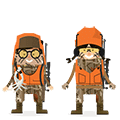
Less than 14 years of age
All hunters who are less than 14 years of age must be supervised by an adult while hunting. The supervising adult must be 18 years of age or older and be certified with their hunter education certificate or be exempt.

14 years of age or older
Hunters who are 14 years of age or older, who were born on or after January 1st, 1973, are permitted to hunt unaccompanied, so long as they have obtained their Hunter Education Certification.
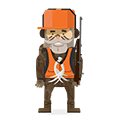
EXCEPTIONS
- Any individual born before January 1, 1973
- Any person who has completed US armed forces basic training, and provided proof of successful completion to the Wisconsin DNR
- Any person who has successfully completed an approved hunter education course from another state, province, or country and has submitted evidence to the DNR

Wisconsin's Hunting Fines

Hunting without a license or permit
Up to $1,000

Unlawful sale of a wild animal
Up to $2,000

Incorrect tagging of a game animal
Up to $1,000

Hunting or possession of elk during closed season
Up to $15,000

Hunting bear with a dog, without the required license
Up to $1,000
WISCONSIN HUNTING FAQS
DO I NEED A HUNTING LICENSE TO HUNT WITHIN THE STATE OF WISCONSIN?
Yes. A Hunting License is different from a Hunter Education Certificate and is required for any person, of any age who hunts any animal within the state of Wisconsin. This includes both residents and non-residents. Varying licenses must be purchased and carried depending on the hunter’s age, residency, and the type of game being hunted. Certain exceptions may apply depending on the game animal being hunted. For more information on Wisconsin hunting licenses visit the Wisconsin DNR website.
WHAT ARE THE WISCONSIN TAGGING REQUIREMENTS?
Certain game animals must be tagged and reported electronically after they’re taken, including big game animals such as deer, bear, and turkey, as well as sharp-tailed grouse. Tags are typically included with or attached to the license type when it’s purchased. In Wisconsin, these tags will also include an authorization number which is required in order to register the harvest. It’s important for hunters to understand the tagging and/or harvest reporting requirements for the game animal they’re hunting, and to ensure that the animal is tagged and reported properly.
GameReg Reporting Requirements
In Wisconsin hunters can register harvested deer, bear, turkey and sharp-tailed grouse electronically or by phone using the GameReg system. This is an electronic registration system that collects harvest information, and provides hunters with a confirmation number upon submitting their report.
Hunters may register for the system online or by phone. Deer and bear hunters may also choose to register in person at an in-person registration station.
How to report:
Online: Hunters can register their harvest online using a computer OR mobile device at gamereg.wi.gov
By Phone: Call 1-844-426-3734 to report a harvest using your phone.
In-Person: Deer and bear hunters may report their harvest in person as designation registration stations.
Additional rules and regulations may apply depending on the game animal. For more information on harvest reporting requirements in Wisconsin, visit the Harvest Registration information page.
WHAT ARE THE HUNTER ORANGE REQUIREMENTS IN WISCONSIN?
All hunters within the state are required to wear hunter orange on at least 50% of their outer clothing during any firearms season. This includes any head covering. Waterfowl hunters are exempt from this regulation.
Additionally, the state will permit camouflage orange or pink, however solid hunter orange is recommended.
WHAT ARE THE BAG LIMITS IN WISCONSIN?
Bag limits are imposed on hunters to restrict the number of a particular game animal that can be taken. Bag limits may be daily or seasonal depending on the type of animal. Seasonal bag limits restrict the number of a particular game animal that may be taken by a hunter within the hunting season.
Bag limits may vary annually depending on game species populations. Hunters must understand and follow bag limit restrictions. Violations may result in fines. For more information on bag limits visit the Wisconsin DNR Website.
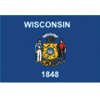
GAME AND NON-GAME SPECIES
GAME SPECIES
Wisconsin offers a wide variety of game species for all types of hunters. Various landscapes including hardwood forests, grassland and the boreal forest merge within the state providing numerous habitats for the state’s wide variety of game animals. In addition the state is known as a hotspot for white-tailed deer.
Game species in Wisconsin include:
- Big game including white-tailed deer, bear, and turkey.
- Small game including rabbit and squirrel
- Waterfowl and other migratory game birds including ducks, geese, mourning dove, coot, moorhen, rails, snipe, and woodcock.
- Furbearers including coyote, fox, beaver, mink, muskrat, fisher, and raccoon among others.
NON-GAME SPECIES
The Wisconsin DNR defines nongame species as “all birds, mammals, and other terrestrial vertebrates which usually have no open season for hunting for trapping.” Threatened and endangered species are also included in this category.
Nongame species within the state include various types of mammals, birds, and amphibians including snakes, bats, cougar, elk, eagles, cricket frogs, martens, and whooping cranes.
Some of these species are also endangered or threatened. It is unlawful to take any endangered, threatened, or protected species. These animals include the gray wolf, flying squirrel, various species of bat, and marten – just to name a few from an ever-growing list.
Taking any non-game species for commercial purposes, such as sale, bartwer or exchange is unlawful in the state, and may result in heavy fines.
Hunters should also note that additional caution should be taken when hunting armadillo and they may carry leprosy.
INVASIVE SPECIES
Invasive animals and other pests have been introduced to the United States, including the State or Wisconsin, and have become a threat to native wildlife. These animals, plants, fish, and invertebrates typically have no natural predators which can result in rapid spread and population growth. This in turn can seriously harm the state’s lands and waters, and can be detrimental to the health and population numbers of a variety of the state’s native plants and animals. Some common invasive species in Wisconsin include Asian lady beetle, mute swan, water hyacinth, and beech marten, among many others.
In order to protect Wisconsin’s native plants and animals, invasive species must be controlled and eradicated. Anyone who encounters or suspects that they have encountered an invasive species within the state is encouraged to report the sighting so that it can be monitored and controlled. For information on how to report various types of invasive species in Wisconsin visit the Wisconsin DNR Invasive Species webpage.

WISCONSIN HUNTING SEASONS
Hunting seasons and dates may change annually per game animal, depending on a variety of factors. Season dates are further broken out by zone, region or Management Units (ex. Deer Management Units) Additionally, seasons are often categorized by firearm time, including archery, firearms, and muzzleloader or “primitive” firearms seasons.
Management Units and Zones
Hunting lands within Wisconsin are divided into regions Management Units or Management Zones, depending on the type of game animal. These regions are used to manage game animals within the state of. For more information on game animal management units and zones, visit the Wisconsin DNR Hunting information page.
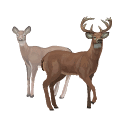
Deer
Deer seasons in Wisconsin are broken down by firearm type and by Deer Management Unit (DMU). Seasons dates vary depending on the DMU and the type of firearm being used. The season typically begins in September and ends in January. Seasons include firearms, archery and crossbow, youth, muzzleloader, and antlerless seasons.
Learn more about hunting deer in Wisconsin.
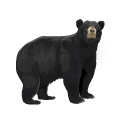
Bear
Bear seasons are organized by type of firearm, and by “zone”. The season typically begins in September and ends in October. Hunter should note that baiting and regulations for hunting with dogs vary depending on the season date and the zone.
Learn more about hunting bear in Wisconsin.
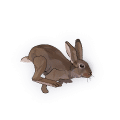
Small Game & Game Birds
There are several small game and game birds to hunt in the State including pheasant, grouse, partridge, quail, dove, snipe, rail, woodcock, squirrels, rabbit, hare, and more. Seasons dates for small game types vary depending on the game animal. Seasons for small game animals typically begin in September and October, ending in December or January.
Learn more about hunting small game in Wisconsin.
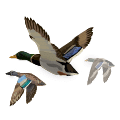
Waterfowl & Migratory Game Birds
Duck hunting seasons are similar to dove, which are also broken out by zones. Seasons include regular and youth-only and range from October – January of the following year.
Learn more about hunting waterfowl and migratory game in Wisconsin.
HUNTING ON PUBLIC OR PRIVATE LAND
PRIVATE LAND
Much of the land in Wisconsin is privately owned. Hunters can typically freely take game animals hunted on their own private property, or may seek permission from a landowner to hunt on private property. Hunters who wish to take game on privately owned land must follow state hunting regulations as well as any regulations specified by the landowner. Hunters must ensure they respect the rights and property of the landowner at all times.
Hunters within the state may also hunt within some Managed Forest Law (MFL) and Forest Crop Law (FCL) Lands. Specific regulations may apply within these areas. For more information on hunting within MFL or FCL lands, visit the Wisconsin DNR website.
PUBLIC LAND
There are 6 million acres of public lands within the state of Wisconsin, many of which are open to hunting. Some of these lands include designated wildlife areas, natural areas, state forests, and federally managed lands. Hunters should note that public lands may be open to multiple types of outdoor recreational activities including hiking, bicycling, bird watching, horseback riding, fishing, paddling and more. Before heading to a public recreation area for hunting, be sure to check that the space is open to hunting activities.
The Wisconsin DNR offers an easy way to find a public hunting area near you. Hunters, and other recreational lands users can visit the Wisconsin DNR Explore Outdoors page, enter their county, preferred activity, property type, or property name, and filter for a list of spaces that match their requirements.
VOLUNTARY PUBLIC ACCESS PROGRAM
The Wisconsin Department of Natural Resources has partnered with and provides financial incentive to private landowners who open their properties to public hunting, fishing, trapping, and wildlife observation.
The participation of these landowners provides access to thousands of acres of private lands to hunters however, the continued access to these lands relies upon the continued participation of landowners. For this reason, landowner properties must be respected and all rules and regulations must be followed by hunters to ensure that these lands remain open to the public,
For more information on the Voluntary Public Access Program, of if you’re interested in participating as a landowner, visit the Wisconsin DNR Voluntary Public Access Program webpage.
Wildlife Areas
What Are Wildlife Management Areas?
Wildlife areas in Wisconsin offer a wide range of outdoor recreational activities. These activities include hunting, fishing, trapping. Additionally, designated spaces within these areas may also permit camping, cycling, horseback riding, and snowmobiling. Dog training for hunting purposes may also be permitted in some areas.
WMA Regulations
Various regulations may apply within designated wildlife areas, depending on the county, region, and which activities are permitted. Some example of regulations the may apply within these areas include:
- ATV and other off-road vehicle restrictions
- Camping restrictions
- Hunting restrictions within certain ares, which may be designated to other recreational activities
The Badger State. Ready and rarin’ to go.

Where to Hunt in Wisconsin
Wisconsin is known for its deer hunting. In fact, the state is known across the US as ‘premier deer hunting country’. If you’re in search of the top spot in the state – head to Buffalo County where the region’s deer have made the Boone and Crocket record books nearly 100 times. Just east of Buffalo County hunters will find another deer hot spot in Trempealeau County, home to the Borst Valley Wildlife Area. Borst Valley is known for it’s deer hunting but also boasts high-quality pheasant and turkey hunting.
In addition to deer, the state also offers plenty of black bear, turkey, waterfowl, upland game, and small game hunting. The state, once again, holds multiple Boone and Crockett records for monster black bear takes. Obtaining a black bear tag in the state’s top regions can take some time, but once you’ve got one you’ll be able to take full advantage. Hunters in search of black bear hunting opportunities should focus their attention in the northern part of the state – top counties include Bayfield, Price, Rusk, Marinette, and Langlade.
Turkey hunting within the state is another great option for hunters – while these large birds were once hunted to the point of extinction in Wisconsin in the 1800’s, they have since been successfully re-introduced (in the 70’s) and populations have flourished. Several counties across the state, and multiple state parks offer turkey hunting opportunities. State parks include Governor Dodge, Devils Lake, Wyalusing and Mirror Lake.